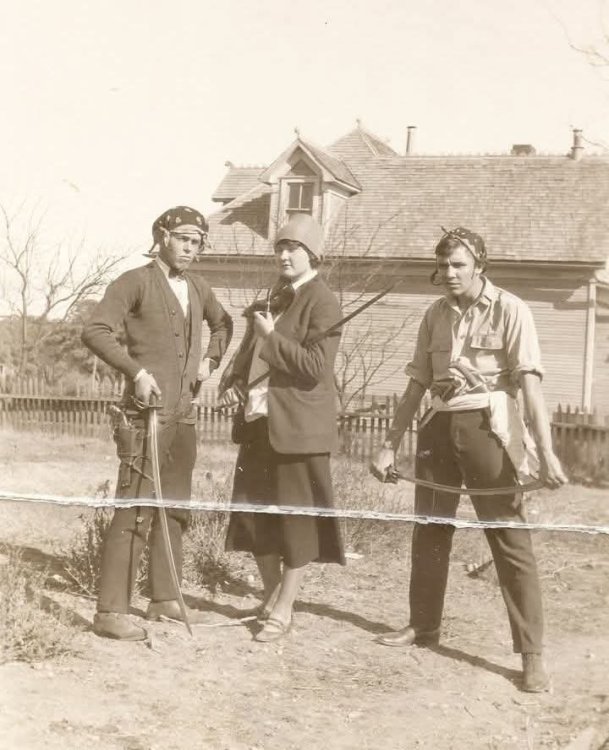-
Posts
53,410 -
Joined
-
Last visited
-
Days Won
631
Content Type
Profiles
Forums
Events
Posts posted by Subdeacon Joe
-
-
4 hours ago, Lobster221 said:
Anything can be possible but not this lol 😂
How authentic is this?
Very.
https://driversfoundation.org/register/39
https://www.instagram.com/its_jalopy_jeff/p/DHHssE8y2pv/?img_index=1
https://www.motortrend.com/vehicle-genres/c12-0509-dodge-deora/
https://rmsothebys.com/auctions/rw09/lots/r184-1965-dodge-deora-concept-car/
https://www.slashgear.com/1684848/dodge-deora-custom-concept-car-hot-wheels-history/
-
-
This crow was eating some walnuts on the ground when a cat tried to jump it. The cat got a tail feather and the crow didn't seem to like that. So it flew into the pepper tree and started calling in its friends. Soon there were a dozen or so in the tree all yelling at the cat.
-
 1
1
-
 2
2
-
-
I would. Wouldn't have gotten in trouble for it as long as I handed it to him unloaded and action open. He would have asked where I found it, and likely called the police and had me show them where it was.
-
 1
1
-
-
-
My wife found a pork receipt that we tried - although I used a small center cut pork loin, about 2 pounds. (safeway "managers special" dropped the price to under $2/lb so it was affordable).
Glazed Rosemary Pork
Ingredients
1/4 cup reduced-sodium chicken broth
3 tablespoons honey
1 tablespoon minced fresh rosemary or 1 teaspoon dried rosemary, crushed
1 tablespoon Dijon mustard
1 teaspoon balsamic vinegar
1/8 teaspoon salt
1/8 teaspoon pepper.
( I just zizzed this, along with the galic listed below in a small food processor)
===================================================
2 pork tenderloins (1 pound each)
(left whole, scored the fat cap in a diamond pattern, only used a total of about 1 tsp of vegetable oil)
2 tablespoons olive oil, divided
4 garlic cloves, minced
Directions
Whisk together first 7 ingredients. Cut tenderloins crosswise into 1-in. slices; pound each with a meat mallet to 1/2-in. thickness.
In a large nonstick skillet, heat 1 tablespoon oil over medium-high heat. In batches, cook pork until a thermometer reads 145°, 3-4 minutes per side. Remove from pan.
In same skillet, heat remaining oil over medium heat; saute garlic until tender, about 1 minute. Stir in broth mixture; bring to a boil, stirring to loosen browned bits from pan. Add pork, turning to coat; heat through.
I left the pork roast whole, seared it off in a lightly oiled black iron skillet, took some hard White Nectarines from the food bank and cut them up, tossed them into the pan, poured the glaze over it, rinsed the bowl of the food processor with about 1/3 cup of water and poured that into the pan.
Baked at 375 F to an internal of 151 F, removed from oven. Put pork on a plate to rest, put ban on stove and reduced the pan juices to a thick glaze. After slicing the pork about 1/8 inch thick, I returned it to the pan and coated it with the glaze. Pretty good stuff.
I'm thinking that this glaze would also work with Shrimp and Chicken.-
 1
1
-
-
-
2 minutes ago, Rip Snorter said:
I almost despair - baby green peas?
That big?
-
 1
1
-
-
5 hours ago, Cyrus Cassidy #45437 said:
Funny thing about the C-130: I've taken off in one a few times, but I've never landed in one!
Sucks when you step out to take a leak at angels 20 and get left behind.

-
 2
2
-
-
6 minutes ago, Rip Snorter said:
On record as the most overturned court.
Now if only SCOTUS would grow a pair and grant cert on this, and all the other anti-civil rights cases.
-
7 minutes ago, Still hand Bill said:
Reading the dissent, the judges said magazines are not arms, so not protected. Looking for a way to not follow bruen.
See the part of one of the dissenting opinions I quoted, the majority said that magazines that can hold 10 rounds or fewer ARE Arms, but somehow adding one more round turns them into accessories.
Part of Kozinski's dissenting opinion in Silveira
comes to mind: "The sheer ponderousness of the panel's opinion — the mountain of verbiage it must deploy to explain away these fourteen short words of constitutional text — refutes its thesis far more convincingly than anything I might say. The panel's labored effort to smother the Second Amendment by sheer body weight has all the grace of a sumo wrestler trying to kill a rattlesnake by sitting on it — and is just as likely to succeed."
-
A quick perusal of the dissenting opinions "
'Second, the majority’s faux-Solomonic splitting of
magazines based on the number of rounds they hold makes
no sense. The majority concedes that magazines holding ten
or fewer rounds are perfectly legal, “integral” components
of “Arms”—entitled to the Second Amendment’s fullest
protection. Id. at 28; see also id. at 27 (“[T]he Second
Amendment’s text necessarily encompasses the corollary
right to possess a magazine . . . just as it protects the right to
possess ammunition and triggers.”). And common sense
dictates that just because a magazine holds more than ten
rounds doesn’t transform it into an accoutrement. Yet the
majority seems to possess magical abilities. See id. at 27.
As soon as you add one more round—poof—the magazine
is no longer “integral” and it disappears from the Second
Amendment’s ambit. Call this the “magic bullet” theory of
the Ninth Circuit. ""CONCLUSION
At each step of this case, the majority has made clear its
disdain for the Supreme Court’s Heller-McDonald-BruenRahimi jurisprudence. But our job is to follow even if we
disagree. Because California’s magazine ban violates the
Second Amendment’s text, history, and tradition, we
respectfully dissent.""Is it just me, or do we seem to be right back where we
were before Bruen? Except somehow worse. In important
ways, the majority’s lax historical balancing test is even
easier for the government to satisfy than intermediate
scrutiny. Here, the majority discusses the burden on an
individual’s right to self-defense, just like it did in Duncan
V. But if the majority can already point to a historical
analogue of a complete ban on a weapon, why does it need
to show a minimal burden at all? Really, so long as it has a
matching “why”—and there always will be a matching
“why” because the inherently dangerous nature of firearms
will always match the majority’s permissive “especially
dangerous” level of generality—any new law could similarly
burden the individual’s right to self-defense in the same way
as any ban at the Founding. Cf. Canjura, 240 N.E.3d at 221–
22 (recognizing that all weapons are inherently dangerous).
More glaringly, when considering whether the risk of
harm is justified, the majority weighs everything in favor of
the government and ignores the always-corresponding
burden that the ban imposes on law-abiding citizens. Like
every part of a firearm, large-capacity magazines are of
138 DUNCAN V. BONTA
course “especially dangerous” in the hands of a criminal. So
is having a semi-automatic instead of a single-shot handgun.
And so is having good sights that help the criminal hit what
he’s aiming at.
On the other hand, not having good sights decreases the
usefulness for law-abiding citizens. And so does having a
lower capacity magazine and being forced to reload when
put in a lawful self-defense situation. Take the majority’s
thrice-repeated line: “The short pauses when a shooter must
reload a firearm afford intended victims and law
enforcement officers a precious opportunity to flee, take
cover, and fight back.” But what of armed victims
attempting to defend themselves and others? They too must
pause to reload, and their pauses give assailants time to get
off more shots. Not to mention the greater potential for
malfunction with every magazine swap. And that is only if
the victim happens to be carrying an extra magazine in a
place where she can quickly get to it. Pauses in shooting
don’t just mean a chance for victims to take cover. Pauses
in shooting while trying to reload also mean a chance for
victims to be overwhelmed by criminal assailants. It always
works both ways.""To sum it up: the majority’s rationale in this case,
followed to its (il)logical conclusion, means that now—
perhaps even more so than before Bruen—only the jankiest
guns are even facially protected by the Second Amendment.
And even those can be banned outright consistent with the
Second Amendment so long as the government can find a
historical analogue with the flimsiest connection to the
challenged law. Despite the Supreme Court’s intervention,
we’re right back where we started when it comes to the
Second Amendment, “trimm[ing] back that right at every
opportunity.” Duncan V, 19 F.4th at 1172 (VanDyke, J.,
dissenting). Except worse. It sadly seems our court has
somehow now established an even more governmentfriendly version of the very interest balancing the Supreme
Court rejected in Bruen. In doing so today, this court once
again improves its undefeated record against the Second
Amendment, demonstrating both its misunderstanding of
firearms and its disdain for the People’s constitutional right
to have them in the process.
And once again, I respectfully dissent."-
 1
1
-
-
Color me shocked. I haven't read this yet.
https://cdn.ca9.uscourts.gov/datastore/opinions/2025/03/20/23-55805.pdf
SCOTUS needs to start taking these Second Amendment cases.
-
 2
2
-
-
2 hours ago, Pat Riot said:
I still think that Tesla truck looks like something out of a “B” Sci-Fi movie from the 1950’s.
Just like the Dodge Deora!

Its parent, the A100 pickup, isn't far behind.
And that from the A100 van.

-
 1
1
-
-
First, one of my peeves....there is no such thing as " gun rights." We don't say "free speech rights," or "assembly rights." "Gun rights" makes it sound like something other than a civil right. If you must, "Second Amendment Civil Rights."
Second, a guy, maybe 18, has been partying, on his way home he stops and takes leak behind some bushes. Someone sees him, reports him to the police. He's arrested, convicted of public indecency. Felony conviction AND is now a registered sex offender. (Alternatively, 16 year old guy gets caught in flagrante with his 17 year old girlfriend, gets convicted of statutory.) Should they get their civil rights restored?
Third, my opinion is that unless it is explicitly called out in the sentencing all civil rights should automatically be restored upon completion of sentence. No matter the crime. No having to petition the courts, no having to fill out forms. Parole/probation officer reports that the person has completed all the conditions and time on whatever kind of supervision, sends notice to the appropriate authority, the person gets a letter a week later verifying that all rights are restored.
-
 1
1
-
 1
1
-
-
I top out at a Serrano heat level. And that only without the seeds and membranes.
-
From FB:
"Picture this: it’s 1967, and automotive innovation is taking a bold leap with the Dodge Deora concept pickup. This isn't just any truck—it's a rolling masterpiece that began its journey as a 1965 A100 pickup before undergoing a radical transformation. The windshield? It’s actually repurposed from the rear window of a 1960 Ford station wagon, giving the Deora its signature, futuristic look.
Crafted by the imaginative minds of Mike and Larry Alexander, this eye-catching creation was designed for the show circuit. But here's where it gets truly intriguing: the Deora has no traditional side doors. Instead, it features a pivoting front panel under the windshield, and the steering wheel swings aside to make way.
And if you think the Deora’s striking appearance is all it has to offer, think again. Mattel immortalized this visionary vehicle as one of the original 16 Hot Wheels die-cast cars, complete with surfboards for that extra cool factor. Despite its sporty exterior, under the hood lies a surprisingly modest 170 cubic inch Slant Six engine, churning out just 101 horsepower with a 3-speed manual transmission.
Dive into the world of automotive wonder and let your imagination roam with this iconic piece of car history."
-
 3
3
-
 1
1
-
-
1 hour ago, Alpo said:
That 40 mm Bofors uses a four round clip? Then why was the guy in the picture loading a six?
Might have been a different Mk. in the film than when she was in.
Or, as isn't unusual in videos, it's a clip for something other than what is mentioned.
-
 1
1
-
-
51 minutes ago, Alpo said:
And he invites this guy that he's never met before to have Christmas dinner with him, just so he won't be alone.
So neither of them will be alone. Because he knows how Rudy would be feeling.
It's a great example of how giving can also be receiving.
53 minutes ago, Alpo said:That's actually sort of depressing when you think about it.
Bittersweet. Turning weeping into joy.
-
 2
2
-
-
As found on FB
"The Texas quote of the day is a good one. It was written in 1932 by Robert E. Howard, author of Conan the Barbarian, in a letter to the famous horror novelist H.P. Lovecraft.
"Mexican dishes I enjoy, but they don't agree with me much. However I generally wrestle with them every time I go to the border. Tamales, enchilados, tacos, chili con carne to a lesser extent, barbecued goat-meat, tortillas, Spanish-cooked rice, frijoles - they play the devil with a white man's digestion, but they have a tang you seldom find in Anglo-Saxon cookery. You know a coyote nor a buzzard never will touch a Mexican's carcass - they can't stand the pepper he ate in his lifetime. The last time I was on the border I discovered one Pablo Ranes, whose dishes smoked with the concentrated essence of hell-fire. I returned to his abode of digestional-damnation until my once powerful constitution was but a shell of itself. I aided Pablo's atrocities with some wine bottled in Spain that kicked like an army mule, and eventually came to the conclusion that the border is a place only for men with cast-iron consciences and copper bellies."
Shown here: Robert E. Howard ---- who was born in Peaster, Texas and raised in Cross Plains, Texas ---- and his two neighbors, Leroy Butler and Leroy’s sister, Faustine, dressed as pirates. Robert E. Howard is on the right. Courtesy Damon Sasser."
-
 7
7
-
 2
2
-
-
I think this is one of the best scenes ever put to film, especially what Pirovich says. And, while Matuschek hints at it, he doesn't invite himself to anyone's house.
-
 3
3
-
-
-
50 minutes ago, Texas Joker said:
If they are incapable of living in society don't let em out. Otherwise why shouldn't they be able to protect themselves like everybody else.
Debt to society paid restore their civil rights.
I would phrase it something like "No longer under supervision." That is, any mandated reporting, check ins, etc.
-
 1
1
-
-
Front line troops.
I bet she was hell on wheels back in the day.
-
 1
1
-
 1
1
-





It's Almost Friday Humor Thread
in SASS Wire Saloon
Posted
I've called half a dozen florists. Not one knew anything about tile, wood flooring, or carpet.
Sad.